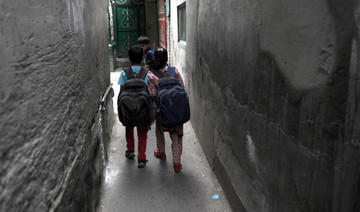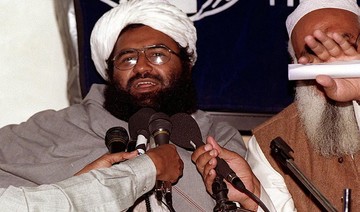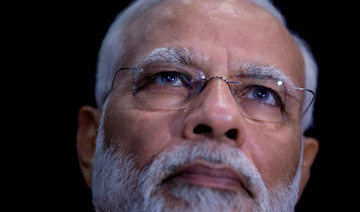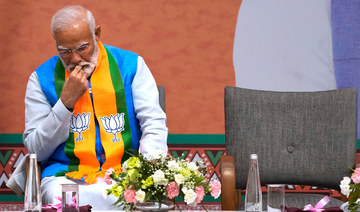ISLAMABAD: At a mosque on a quiet Islamabad street, any reference to the UN-listed terror group which runs it has been removed as Pakistan — once again — comes under pressure to demonstrate its sincerity about eliminating militancy.
The first wave of militant detentions was announced by Islamabad on March 5, as tensions were still cooling between India and Pakistan after their latest confrontation over the disputed Kashmir region.
New Delhi has long accused Islamabad of harboring militant groups, which it says are used by Pakistan intelligence agencies to attack India.
The February 14 suicide blast in Indian-administered Kashmir — claimed by Pakistan-based Jaish-e-Mohammed — is the latest example, and the attack which ignited the recent crisis between the nuclear-armed neighbors.
Since March 5, Pakistani authorities have arrested hundreds of suspected Islamist militants and shuttered more than 700 madrassas, mosques, and clinics linked to banned groups.
Mosques like the Al-Quba mosque visited by AFP in Islamabad — which is run by Jamaat-ud-Dawa (JuD), seen by the UN as a charity front for an anti-India militant group — have had all signs announcing their links to such organizations removed.
Instead, a green sign clinging to a post proclaims the new management of the premises by the “Government of Pakistan.”
“This government will not allow Pakistan’s land to be used for any kind of outside terrorism,” vowed Prime Minister Imran Khan earlier this month.
But the crackdown is reminiscent of previous efforts, and Pakistan has yet to convince the international community that their latest thrust is sincere.
Cracks have already begun to emerge after Pakistan’s longtime ally China this week blocked measures by the UN Security Council to blacklist JeM leader Masood Azhar.
It was the fourth time China has blocked such attempts, reinforcing suspicions that it was acting on Pakistan’s behest. If so, observers said, the move undermined the sincerity of the crackdown.
Had Azhar been blacklisted, Pakistan would have been morally compelled to halt his activities, a Western diplomat said.
“Is Pakistan just trying to fool us?” the diplomat asked. “I would say yes.”
New Delhi also remained skeptical.
“The widespread presence of terrorist camps in Pakistan is public knowledge within and outside Pakistan,” said Indian foreign ministry spokesman Raveesh Kumar last week.
The crackdown has largely targeted JeM along with JuD, which is linked to Lashkar-e-Taiba, the group accused by India and Washington of masterminding the terrorist attacks in Mumbai in 2008.
Shuttering groups like JuD — which provides widespread and vital services like health care to poor communities in a developing country where government-run social services are sorely lacking — risks a potential backlash.
“We were ordered to close the health centers and give our ambulances to the authorities,” Akbar Khan, a JuD official based in the northwestern city of Peshawar, said.
“Our leaders asked us to accept everything and to keep a low profile,” he added.
A source close to JeM said the ongoing operation was unprecedented in its scale.
“Almost the entire leadership of JeM has been detained, all the clerics and head clerics have been replaced and administrative control of all our mosques have also been taken over,” said the source.
“We have never seen such harsh steps in past.”
However, the operation mirrors similar crackdowns on militants, such as after attacks on the Indian parliament in 2001 and in Mumbai in 2008.
Then, extremists were also detained — only for many to be released later, and the groups allowed to continue their activities, both militant and charitable.
Pakistan has also not yet demonstrated its willingness to go any further than detentions and closures.
“Closing major infrastructures is a very important step, but it doesn’t show that the whole network has been dismantled,” said analyst Huma Yusuf, a fellow with the Washington-based Wilson Center.
“There are still thousands of militants in the country. What do you do with them? A peace and reconciliation process? A deradicalization plan? Anything? Right now, there is nothing.”
The crisis also comes as Pakistan is facing possible sanctions from the Financial Action Task Force — an anti-money laundering monitor based in Paris — for failing to rein in terror financing.
The organization will soon decide whether to add Pakistan to a blacklist that would trigger automatic sanctions, further weakening Pakistan’s already faltering economy.
Analysts fear even those headwinds may not be enough to convince the Pakistani intelligence agencies to cut their alleged ties with militants.
“Why would they give away something that they have created, nurtured and defended for 30 years?” said author Myra MacDonald, a researcher specializing in Pakistan.
“There is a concern that if you hit them too hard, they will hit the Pakistani state back.”
Pakistan’s crackdown on militants fails to convince skeptics
Pakistan’s crackdown on militants fails to convince skeptics
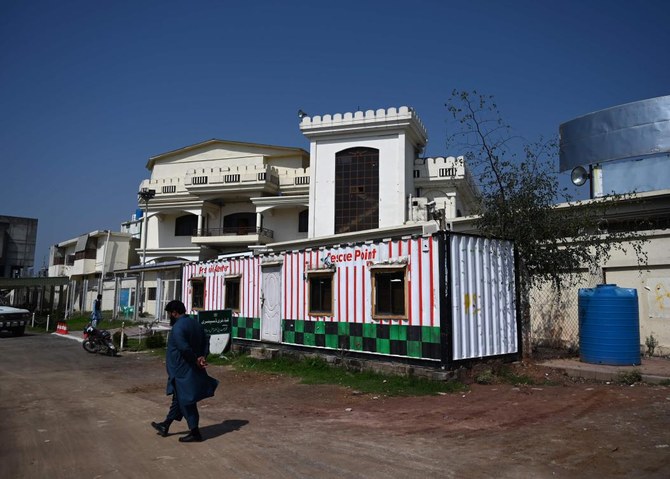
- The first wave of militant detentions was announced by Islamabad on March 5
- Pakistani authorities have arrested hundreds of suspected Islamist militants and shuttered more than 700 madrassas, mosques, and clinics linked to banned groups
Austin: No indication Hamas planning attack on US troops

- Israel has killed more than 34,000 Palestinians, according to Gaza’s Health Ministry
WASHINGTON: US Defense Secretary Lloyd Austin said he did not see any indication Hamas was planning any attack on US troops in Gaza but added adequate measures were being put in place for the safety of military personnel.
“I don’t discuss intelligence information at the podium. But I don’t see any indications currently that there is an active intent to do that,” Austin said during a press briefing.
“Having said that ... this is a combat zone and a number of things can happen, and a number of things will happen.”
Austin’s remarks came as the US military said it was temporarily pausing the offshore construction of a maritime pier because of weather conditions and instead would continue building it at the Israeli Port of Ashdod.
FASTFACT
The US military says it is temporarily pausing the offshore construction of a maritime pier because of weather conditions.
The maritime pier, once built, will be placed off the coast of Gaza in a bid to speed the flow of humanitarian aid into the enclave.
“Forecasted high winds and high sea swells caused unsafe conditions for soldiers working on the surface of the partially constructed pier,” the US military said in a statement.
“The partially built pier and military vessels involved in its construction have moved to the Port of Ashdod, where assembly will continue,” it added.
Earlier this week, the Pentagon said about 50 percent of the pier had been constructed.
Israel has sought to demonstrate it is not blocking aid to Gaza, especially since President Joe Biden issued a stark warning to Prime Minister Benjamin Netanyahu, saying Washington’s policy could shift if Israel fails to take steps to address civilian harm, humanitarian suffering, and the safety of aid workers.
US officials and aid groups say some progress has been made but warn it is insufficient, amid stark warnings of imminent famine among Gaza’s 2.3 million people.
The humanitarian situation in Gaza — which has been devastated by more than six months of Israeli operations against Hamas — remains dire, with a senior US administration official saying last week that the territory’s entire population of 2.2 million people is facing food insecurity.
Canada police charge three with murder of Sikh leader Nijjar

- Nijjar was a Canadian citizen campaigning for the creation of Khalistan, an independent Sikh homeland
OTTAWA: Canadian police said on Friday they had arrested and charged three Indian nationals with the murder of Sikh separatist leader Hardeep Singh Nijjar in June 2023 and said they were probing possible links to the Indian government.
Nijjar, 45, was shot dead outside a Sikh temple in Surrey, a Vancouver suburb with a large Sikh population. Canadian Prime Minister Justin Trudeau has cited evidence of Indian government involvement, prompting a diplomatic crisis with New Delhi.
Assistant Commissioner David Teboul said the matter was still under investigation and other probes were being carried out. These “include investigating connections to the government of India,” he told a televised news conference.
Nijjar was a Canadian citizen campaigning for the creation of Khalistan, an independent Sikh homeland carved out of India. The presence of Sikh separatist groups in Canada has long frustrated New Delhi, which had labeled Nijjar a “terrorist.”
Last week the White House expressed concern about the reported role of the Indian intelligence service in assassination plots in Canada and the United States.
India’s Rahul Gandhi to contest elections from family borough

- Gandhi contests polls from second seat in family bastion
- Emotional moment to contest from Raebareli, Gandhi says
NEW DELHI: Indian opposition leader Rahul Gandhi will contest the general election from the family bastion in the north, his Congress Party announced on Friday, a move that will challenge Prime Minister Narendra Modi in a region he dominates.
Gandhi, the scion of the Nehru-Gandhi dynasty, will contest from Raebareli in politically crucial Uttar Pradesh state, Congress said, in addition to Wayanad in Kerala state in the south, which has already voted. India allows candidates to contest multiple constituencies but they can represent only one.
Uttar Pradesh is India’s most populous state and elects 80 lawmakers to the lower house of parliament, the most of any state. In the last election in 2019, Modi’s Bharatiya Janata Party and allies won 64 seats, including from Amethi, adjacent to Raebareli, where Gandhi was defeated.
His return to the area, albeit for a second constituency, will invigorate the party, Congress officials said.
Gandhi said being nominated from Raebareli was an “emotional moment” for him.
“My mother has entrusted me with the responsibility ... with great confidence and given me the opportunity to serve it,” he posted on X.
“In the ongoing battle for justice and against injustice, I seek the love and blessings of my loved ones. I am confident that all of you are standing with me in this battle to save the constitution and democracy,” he said.
Gandhi’s mother Sonia won from Raebareli in 2019, which has returned a Congress candidate in 17 of the 20 elections held there since 1952, mostly members of the Gandhi family. Sonia Gandhi is now a member of the upper house of parliament.
Modi is widely expected to win a rare third term in the general election that got underway on April 19 and concludes on June 1, with votes set to be counted on June 4.
However, analysts say a low voter turnout in the first two phases of the seven-phase election has dampened hopes of a huge majority for the party, although they said the BJP was still likely to retain power in the world’s most populous nation.
Soon after the announcement, Gandhi flew to Raebareli in a private aircraft, accompanied by his mother Sonia, sister Priyanka and senior Congress leaders, and filed his nomination papers.
Modi and the BJP attacked Gandhi for the decision.
“I had said that the prince will lose in Wayanad and in fear of his loss ... he will look for another seat,” Modi said on Friday, referring to Gandhi.
“I also want to tell them wholeheartedly, do not be afraid, do not run away,” Modi said.
Congress has ruled India for 54 of its 76 years since independence from Britain, and members of the Nehru-Gandhi family were prime ministers for more than 37 of those 54 years.
However, the party has floundered since it was swept out of power by Modi in 2014 and has been struggling to revive itself.
Gandhi contesting from Raebareli is good news for the opposition INDIA alliance of 27 parties that Congress leads, said Rasheed Kidwai, political analyst and visiting fellow at New Delhi’s Observer Research Foundation.
“The significance of Rahul contesting here is that it will boost the alliance with Samajwadi Party,” Kidwai said referring to the regional partner of Congress in Uttar Pradesh. “The opposition story is not all that bad and this will force a contest with BJP.”
Defense chiefs from US, Australia, Japan and Philippines vow to deepen cooperation

- Defense chiefs from the four nations held their first meeting in Singapore last year
HONOLULU: Defense chiefs from the US, Australia, Japan and the Philippines vowed to deepen their cooperation as they gathered Thursday in Hawaii for their second-ever joint meeting amid concerns about China’s operations in the South China Sea.
The meeting came after the four countries last month held their first joint naval exercises in the South China Sea, a major shipping route where Beijing has long-simmering territorial disputes with a number of Southeast Asian nations and has caused alarm with its recent assertiveness in the waters.
US Defense Secretary Lloyd Austin told reporters at a news conference after their discussion that the drills strengthened the ability of the nations to work together, build bonds among their forces and underscore their shared commitment to international law in the waterway.
HIGHLIGHT
The meeting came after the four countries last month held their first joint naval exercises in the South China Sea, a major shipping route where Beijing has long-simmering territorial disputes with a number of Southeast Asian nations and has caused alarm with its recent assertiveness in the waters.
Australian Defense Minister Richard Marles said the defense chiefs talked about increasing the tempo of their defense exercises.
“Today, the meetings that we have held represent a very significant message to the region and to the world about four democracies which are committed to the global rules-based order,” Marles said at the joint news conference with his counterparts.
Austin hosted the defense chiefs at the US military’s regional headquarters, US Indo-Pacific Command, at Camp H.M. Smith in the hills above Pearl Harbor. Earlier in the day, Austin had separate bilateral meetings with Australia and Japan followed by a trilateral meeting with Australia and Japan.
Defense chiefs from the four nations held their first meeting in Singapore last year.
The US has decades-old defense treaties with all three nations.
The US lays no claims to the South China Sea, but has deployed Navy ships and fighter jets in what it calls freedom of navigation operations that have challenged China’s claims to virtually the entire waterway. The US says freedom of navigation and overflight in the waters is in America’s national interest.
Aside from China and the Philippines, Vietnam, Malaysia, Taiwan and Brunei also have overlapping claims in the resource-rich sea. Beijing has refused to recognize a 2016 international arbitration ruling that invalidated its expansive claims on historical grounds.
Skirmishes between Beijing and Manila in particular have flared since last year. Earlier this week, Chinese coast guard ships fired water cannons at two Philippine patrol vessels off off Scarborough Shoal, damaging both.
The repeated high-seas confrontations have sparked fears of a larger conflict that could put China and the United States on a collision course.. The US has warned repeatedly that it’s obligated to defend the Philippines — its oldest treaty ally in Asia — if Filipino forces, ships or aircraft come under an armed attack, including in the South China Sea.
President Joe Biden’s administration has said it aims to build what it calls a “latticework” of alliances in the Indo-Pacific even as the US grapples with the Israel-Hamas war and Russia’s ongoing invasion of Ukraine.
Beijing says the strengthening of US alliances in Asia is aimed at containing China and threatens regional stability.
Senior Labour official admits Gaza has cost party votes in local elections

- Pat McFadden says leadership’s stance on conflict has been ‘a factor in some places’
- Prof. John Curtice says Labour has performed ‘quite badly’ among Muslim voters
LONDON: A senior Labour official has suggested the party’s stance on Gaza might have affected its performance in local elections in the UK.
A series of votes took place this week nationwide to elect new mayors in multiple major cities, as well as council members and police and crime commissioners.
Labour was expected to perform strongly, but Pat McFadden, Labour’s national campaign coordinator, told Sky News that Gaza had been “a factor in some places,” adding that with “so many innocent people being killed I’m not surprised people have strong feelings about that.”
Party sources suggested turnout in key areas was lower than anticipated, with many Muslim voters choosing not to vote, including in one key election in the West Midlands where lack of support saw Labour lose the local mayoralty to the Conservative incumbent Andy Street.
It comes weeks after former Labour MP George Galloway was elected to represent the formerly safe Labour constituency of Rochdale in Parliament, with Israel’s ongoing war in Gaza a key theme of the campaign.
Galloway has since said his Workers Party of Britain will seek to stand candidates in every constituency at the next UK general election.
An anonymous Labour source in the West Midlands told The Times: “We (would) have beaten him (Andy Street) as a general rule, but the Muslim vote has collapsed to the Galloway-backed independent.”
Another source quoted by the BBC caused controversy and was accused of racism by Conservative sources for saying: “It’s the Middle East, not West Midlands, that will have won Andy Street the mayoralty. Once again Hamas are the real villains.”
In a statement, Labour told ITV: “The Labour Party has strongly condemned this racist quote which has not come from anyone who is speaking on behalf of the party or whose values are welcome in the party.”
Labour lost its 13-year spell controlling the local council in Oldham, having seen its majority reduced in recent weeks ahead of the elections following defections by councilors opposed to Labour leader Keir Starmer’s stance on Gaza.
However, Arooj Shah, Labour’s council chief in Oldham, disputed that Gaza was the main issue, telling The Independent: “I don’t think that’s a fair statement to make, given that the issue of Gaza has been over the last year, but what we’ve seen in Oldham is a lot longer than that. We have had 13 years of austerity and that’s been really, really difficult.”
Elsewhere, Green Party candidates also claimed former Labour seats in Newcastle and Bolton.
Nick Peel, Labour’s council leader for Bolton, told The Independent: “As a direct result of the ongoing humanitarian crisis in Palestine, many South Asian voters have not supported Labour or Conservative.”
Chris Hopkins, political research director for market research company Savanta, told The Independent that Labour could lose more council seats in areas with significant Muslim populations, such as Bradford and Burnley, over the Gaza issue as results continued to be announced.
Leading pollster Prof. John Curtice told the paper that “Labour has actually done quite badly” in areas of the country with large Muslim communities, and warned that the trend could harm the party ahead of the next general election.
Starmer told the BBC: “I’m concerned wherever we lose votes and we intend to win back any votes we have lost.
“But there’s no denying that across the country, whether it’s Hartlepool in the north or Rushmoor in the south, or Redditch, a bellwether seat, we are winning votes across the country. And that, I think, reflects a changed Labour Party with a positive case to take to the country.”


